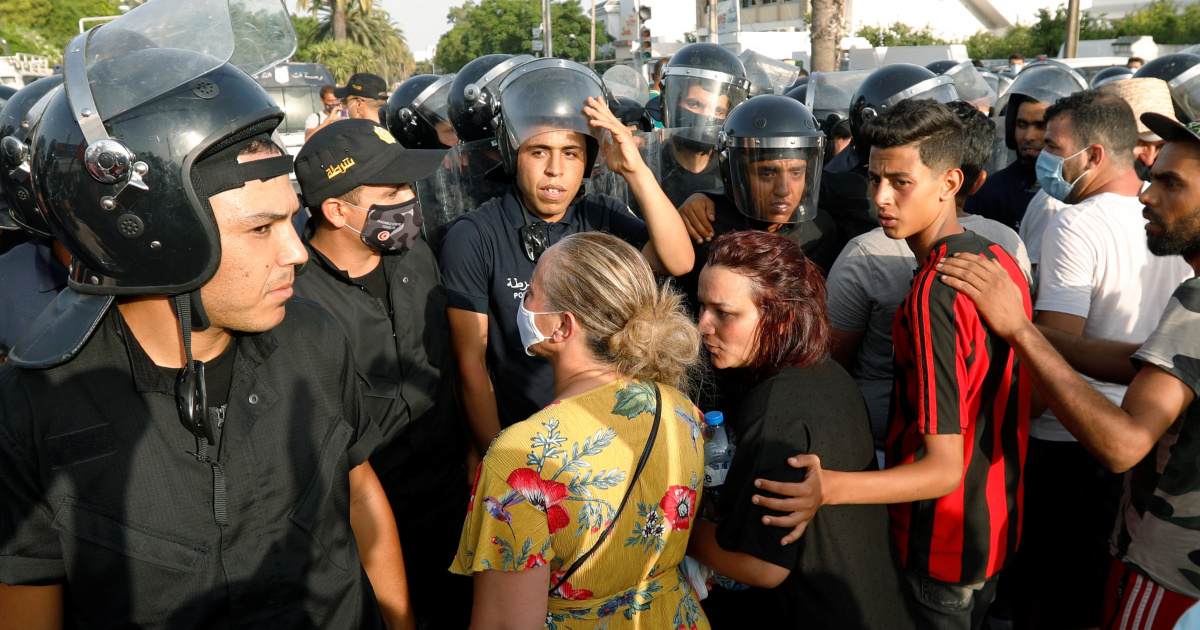Tunisia tries to reassure as Ennahdha presses for early elections

Largest political bloc ‘ready’ for legislative and presidential polls at it warns of risk of ‘autocratic’ rule.
Tunisia’s foreign minister phoned his counterparts in the European Union, as well as Turkey and the High Commissioner for Human Rights to reassure them after the president suspended parliament and dismissed the government, the ministry said late on Tuesday, as the opposition called for elections.
Foreign Minister Othman Jerandi said he explained that the extraordinary measures were temporary and that his counterparts pledged their continued support to the fledgling democracy.
Earlier on Tuesday, Saudi Arabia affirmed its confidence in Tunisia’s leadership, according to the Saudi state news agency (SPA).
“Saudi Arabia affirms its confidence in the Tunisian leadership to overcome these circumstances and to achieve a decent life and prosperity for the brotherly Tunisian people.”
The country was plunged into crisis after President Kais Saied removed the government with help from the army, a move denounced as a coup by Tunisia’s main parties including the largest political bloc, Ennahdha.
The Moroccan and Algerian foreign ministers, Nasser Bourita and Ramtane Lamamra, also met Saied in Tunis on Tuesday, according to the Tunisian foreign ministry.
Call for elections
Opponents of Saied have said they are ready for early elections while warning against an “autocratic regime”.
The Ennahdha party said that “for the sake of the democratic path,” it is “ready to go to early legislative and presidential elections” while warning “that any delay is not used as a pretext to maintain an autocratic regime”.
The party also accused Saied of having “worked with undemocratic forces to overturn the constitutional rights of elected officials and replace them with members of his own “chosen cabal”.
Noureddine Bhiri, a senior Ennahdha leader, said the party had “decided to campaign peacefully to defeat” the president’s plans, saying “national solidarity” was needed.
But before any elections, “parliament should resume its activities and the military end its control,” Bhiri told the AFP news agency.
Police officers stand guard outside the parliament building in Tunis on Tuesday [Zoubeir Souissi/Reuters]
‘Organised thugs’
After violent clashes on Monday, Ennahdha said “organised thugs” were being used to “provoke bloodshed and chaos”, and urged its supporters “to go home in the interests of maintaining the peace and security of our nation”.
The young North African democracy of 12 million people, the cradle of the Arab Spring uprisings 10 years ago, was thrust into a constitutional crisis on Sunday.
Saied appeared on national television to declare he had dismissed the premier, Hichem Mechichi and ordered parliament closed for 30 days, later sending army troops to the legislature and the prime minister’s office.
The president’s actions, ostensibly “to save Tunisia”, followed a day of street protests against the government’s poor handling of the COVID-19 pandemic, which has left Tunisia with one of the world’s highest official per-capita death tolls.
The president also said he would choose a new prime minister, lifted the parliamentary immunity of legislators and warned armed opposition would be met with a “rain of bullets”. He later fired the defence and justice ministers.
Street clashes between his backers and opponents broke out on Monday outside the barricaded parliament, leaving several people wounded.
Police also shut down the office of Qatar-based broadcaster Al Jazeera, the parent company of Al Jazeera English online.
The office of the Tunisian parliament, chaired by Ennahdha leader Rached Ghannouchi, late on Monday voiced its “absolute rejection and strong condemnation” of the president’s actions.
Tunisia’s economy shrank 8.6 percent last year, and another 3 percent in the first three months of this year on an annualized basis, according to government data. Tourism, a bedrock of the economy that brings in foreign exchange, was decimated in 2020. https://t.co/nlDLrNqaW1 — Ramy Allahoum (علاهم) (@rallahoum) July 26, 2021
‘Principles of democracy’
Many Tunisians have expressed support for the president and thousands flooded the streets to celebrate on Sunday night but others voiced fear of a return to dictatorship.
The French language newspaper Le Quotidien on Tuesday wrote that Saied’s “kick … in the parliamentary ant hill has taken many people by surprise, starting with Ennahdha”.
The young democracy had often been cited as the sole success story of the Arab Spring, which was sparked across the region after Mohamed Bouazizi, a university graduate who could only find work as a fruit vendor, set himself alight in December 2010.
Tunisia, located between Algeria which faces political turmoil and war-battered Libya, is seen as key to regional stability.
US Secretary of State Antony Blinken on Monday spoke by telephone with Saied and urged him “to adhere to the principles of democracy and human rights that are the basis of governance in Tunisia”.
The top US diplomat urged Saied to “maintain open dialogue with all political actors and the Tunisian people,” the State Department said.
The European Union’s foreign policy chief Josep Borrell on Tuesday urged “the resumption of parliamentary activity, respect for fundamental rights and an abstention from all forms of violence”.
Moussa Faki Mahamat, the chairman of the African Union Commission on Tuesday called for “the strict respect of the Tunisian constitution … and the promotion of political dialogue”.






